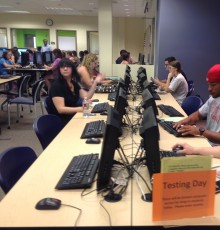 Students taking test in Math Foundations Center
What is ALEKS?
Students taking test in Math Foundations Center
What is ALEKS?
ALEKS has been a popular name in the MAT092/MAT090 Introductory Algebra classrooms over the last couple years. ALEKS, Assessment and Learning in Knowledge Spaces, is a web-based, artificially intelligent assessment and learning system. ALEKS uses adaptive questioning to quickly and accurately determine what a student knows and doesn’t know in a course. ALEKS then instructs the student on the topics he/she is most ready to learn. As a student works through a course, ALEKS periodically reassesses the student to ensure that topics learned are also retained. ALEKS course are very complete in their topic coverage.
ALEKS Pilot-Phase I (2012)
With monies received from our Title III grant, all MAT090/092 classes completed a pre-test and a post-test in the ALEKS program for Fall 2012 that assessed student mastery of MAT092 prerequisite concepts. Diagnostic scores placed students in either “unprepared”, “at risk” or “prepared” categories. Furthermore, a statistically significant, randomly selected subset of sections was chosen to complete an additional 6-week Prep for Beginning Algebra remediation in ALEKS for the first six weeks of the semester.
Effectiveness
The results were unmistakable – students who entered MAT092 in the “unprepared” category dramatically increased their chances to pass the class when they worked in the 6-week ALEKS remediation program to improve their understanding of prerequisite material to the “prepared” category. Specifically, the unprepared students who were not selected to participate in remediation passed the course at a 45% rate compared to 78% for the selected remediation group that improved to “prepared” on the ALEKS diagnostic. Course withdrawal rates were also significantly lower for students who were able to move into the “prepared” category by the end of the six-week program. (Students who moved from an “unprepared” status to a “prepared” status had a withdrawal rate of 12%. The “unprepared” students who were not selected to participate in the remediation program had a withdrawal rate of 29%.) Students who began in the “at-risk” remediation group also had improved outcomes.
Source: ALEKS Pilot Fall 2012 – Report, Mesa Community College Office of Research & Planning.
Student Time on Task
Additionally, the data collected revealed approximately how much time working in the ALEKS environment correlated with the increase in success rates. Results showed that a minimum of 10 hours of work in the ALEKS environment correlated with the leap in preparedness, and therefore the increased probability of passing the class.
ALEKS Pilot-Phase II (2013)
Use of the ALEKS program continued into the 2013-2014 academic year with MAT090/092 section instructors volunteering to use the ALEKS program in their classes. In Fall 2013, approximately 700 students participated in the six week ALEKS Prep for Beginning Algebra course, with approximately 300 students taking the course in the Spring of 2014, all courtesy of the Title III grant.
Effectiveness
The data collected so far is outstanding! The program study showed that the “unprepared” students who spent the most time in ALEKS had the best assessment results at the end of the six weeks. In general, students who logged fifteen hours or more were the most likely to show improvement in their diagnostic scores. Those who spent between 10 and 14.9 hours of time in ALEKS also displayed positive outcomes overall. “Unprepared” students and “at-risk” students who moved to “prepared” at the end of the ALEKS course showed successful class completion rates of 69% and 70% respectively. The success rate for all students who took MAT092 in the Fall 2013 was 48%. That amounts to a 20+ point difference between the overall MAT092 completion rate and the completion rates of students in the “unprepared” and “at-risk” remediation groups who became successfully prepared in six weeks.
Sources: ALEKS Fall 2013 – Report and MCC – Table 28 MAT082-092 Data Fall 2013, Mesa Community College Office of Research & Planning.
